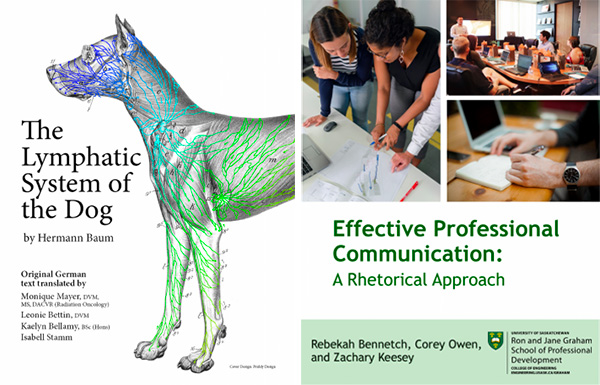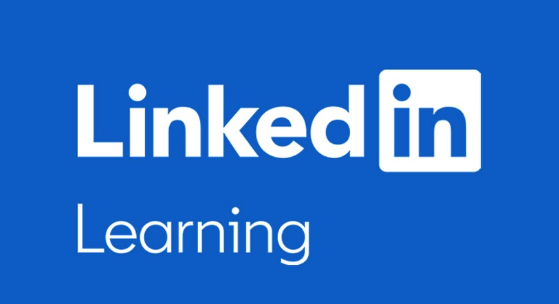In this Issue: News and Updates to Kick Off 2023
-
- USask Open Textbooks Named to “Best of Pressbooks 2022”
- Linkedin Learning Subscription No Longer Available at USask
- Upcoming PD Opportunities with Perusall
- Emerging AI Technology: What Does it Mean for Education?
- Canvas Quick Tip: Link Validator
- DEU Support and Contact Information
USask Open Textbooks Named to “Best of Pressbooks 2022”
Last year ended with some happy news for the USask open publishing community! Two open textbooks published on USask Open Press were recognized on “best of 2022” lists.

The Lymphatic System of the Dog by Hermann Baum, as translated and adapted by Monique Mayer (Western College of Veterinary Medicine) with Loenie Bettin, Kaelyn Bellamy, and Isabell Stamm, was named to the Pressbooks Staff Favourites of 2022.
Effective Professional Communication: A Rhetorical Approach by Rebekah Bennetch (College of Engineering) with Corey Owen and Zachary Keesey, was also named to the Pressbooks Staff Favourites of 2022, in addition to being recognized by users on the Pressbooks Community Favourites of 2022.
Congratulations to the creators who helped both of these books come to life! Learn more about locally-developed open textbooks, as well as supports available for creating open educational resources, in the November issue of the DEU Digest.
Linkedin Learning Subscription No Longer Available at USask
 As of January 1, 2023, USask has terminated its campus-wide LinkedIn Learning subscription.
As of January 1, 2023, USask has terminated its campus-wide LinkedIn Learning subscription.
While there is no direct replacement for LinkedIn Learning, the USask Library offers 50 databases with video content that may support your course learning outcomes: A-Z Databases: Videos – University Library. Here is a selection of databases that offer video-based training content:
-
- O’Reilly Books: O’Reilly offers a wide selection of video-based training courses in various technology-related disciplines, including software development, web development, and cloud computing. To access the training video content, open the link above, click “Start Learning” at the top of the page, and then click “Courses”.
- SAGE Research Methods Videos: If your course is research-focused, consider exploring the video tutorials offered by SAGE Research Methods. To access the SAGE training video content, click the link above and scroll down to “Browse by”, then click the “Video Type” tab, followed by “Tutorial”.
- Films on Demand: Master Academic Collection: With thousands of instructional videos, as well as documentaries and films, Films on Demand offers a wealth of content for your course. While there is no way to filter out instructional videos, specifically, content is divided by discipline, including education, engineering, nursing, and science. After opening Films on Demand via the link above, access your desired subject by clicking the ≡ icon in the top-left corner, or by using the search bar at the top.
Upcoming PD Opportunities with Perusall

Perusall is a social annotation tool that allows students, instructors, and TAs to annotate or markup learning materials collaboratively, responding to others’ questions and comments right on the material being discussed. It can be used with PDFs of articles, problem-sets, OERs (Open Educational Resources), Word documents, videos, web pages, code, etc. – essentially anything you have the right to use.
If you’d like to learn more about how to start using this tool, there are a number of free training opportunities offered directly from Perusall in the next several weeks:
-
- Perusall 101: Designed for instructors who are new to Perusall, this webinar covers how to create your course, make assignments, create groups, and preview Perusall’s peer-to-peer engagement features. Offered on Jan. 9, Jan. 23, or Feb. 6.
- Perusall 102: Designed for instructors who have used Perusall before, this webinar will cover more advanced features, such as peer review assignments, scoring options, LMS integration, and more. Offered on Jan. 11, Jan. 25, or Feb. 8.
- Perusall Train the Trainer: Designed for instructional designers, this webinar provides a broad overview of creating an account, common FAQs, full LMS integration with grade sync, and more. Offered on Jan. 13, Jan. 27, or Feb. 10.
There is also an upcoming workshop offered through the Gwenna Moss Centre for Teaching and Learning:
-
- Student Engagement with Course Readings and One Another using Perusall.In this session, you will be introduced to Perusall, get to try it out, and leave being able to complete the basic setup in your Canvas course. Explore tips for using the features of Perusall, including assignment settings and reviewing student annotations. Offered on Feb. 2.
Note: The copyright considerations for using learning materials on Perusall are similar to those in place for using materials on Canvas. Please consult FAQ #9 on this Library pagefor copyright implications.
Emerging AI Technology: What Does it Mean for Education?

Educator circles around the web have been abuzz recently following the news of OpenAI’s ChatGPT, a free AI (artificial intelligence) text generator which was launched on Dec. 2. The sophisticated nature of this new tool means that its abilities to replicate “real” human writing are impressive, and emerging AI technologies could have some major implications for assessment design, grading and academic integrity practices, and ethical edtech use in higher education.
This conversation is a deeper one than this newsletter can get into, but if you’d like to better understand recent discussions happening about AI technologies, potential issues for teaching and learning, and some suggestions for how educators might respond, here are some recommended links to explore:
-
- Slide deck: ChatGPT & Education (CC BY-NC 4.0) by Dr. Torrey Trust, University of Massachusetts Amherst. This offers a great overview of the ChatGPT tool, including what it can do, what it can NOT do, and some ideas and resources to help educators respond.
- Article: Eight ways to engage with AI writers in higher education by Lucinda McKnight for Times Higher Education.
- Webinar recording (from Dec. 17, 2022): What can our classrooms look like after sites like Chegg, Photomath and OpenAI change what it means to ‘do your own work’? with Dave Cormier (University of Windsor) and Brenna Clarke Grey (Thompson Rivers University).
- Podcast episode: We Are Not Good Thought Leaders by Brenna Clarke Grey with Brian Lamb for You Got This!, TRU.
Photo by Tara Winstead from Pexels.
Canvas Quick Tip: Link Validator
 Unfortunately, if your online course contains a lot of internal links, or external links to learning materials from around the web, it’s likely that you will have some broken or dead links on occasion. Checking that all of the links in your course still direct to the correct content is a bit of an annoying course maintenance task.
Unfortunately, if your online course contains a lot of internal links, or external links to learning materials from around the web, it’s likely that you will have some broken or dead links on occasion. Checking that all of the links in your course still direct to the correct content is a bit of an annoying course maintenance task.
Did you know? The Canvas Link Validator tool can search through course content and quickly let you know if there are any invalid or unresponsive course content links in both published and unpublished content. Learn more about this tool at: How do I validate links in a course?
Note: The Link Validator tool might not catch dead links to external (3rd party) websites, as such pages might still seem to be “responsive” even if a content change means it no longer contains the information your students need.
Icon by Julien Deveaux from Noun Project.


